
Find Help
More Items From Ergsy search
-

Local Councils Struggle with Increasing Demand for Welfare Support
Relevance: 100%
-
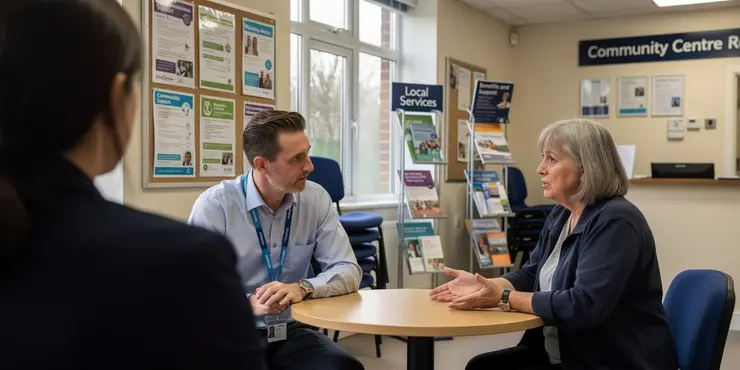
Local Councils Call for More Funding to Support Rising Homelessness
Relevance: 38%
-
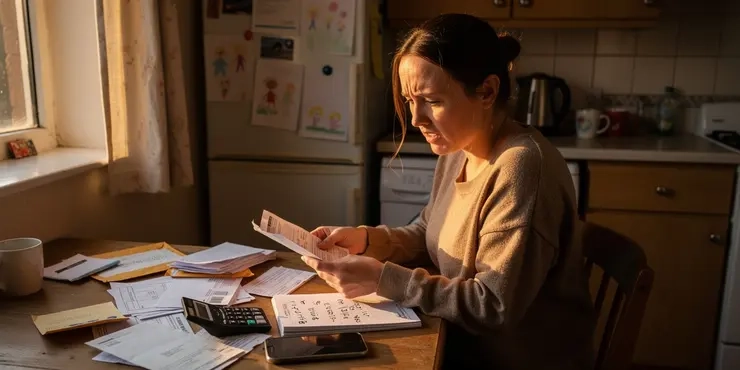
Proposed Welfare Cuts and Their Impact on Vulnerable Populations
Relevance: 35%
-

Study Reveals Disparities in Welfare Support Between Urban and Rural Areas
Relevance: 34%
-

Why are council burial fees going up nearly 50% in the UK?
Relevance: 29%
-

Government Faces Backlash Over Welfare System Access Delays
Relevance: 29%
-

What role do local councils play under the new law?
Relevance: 29%
-
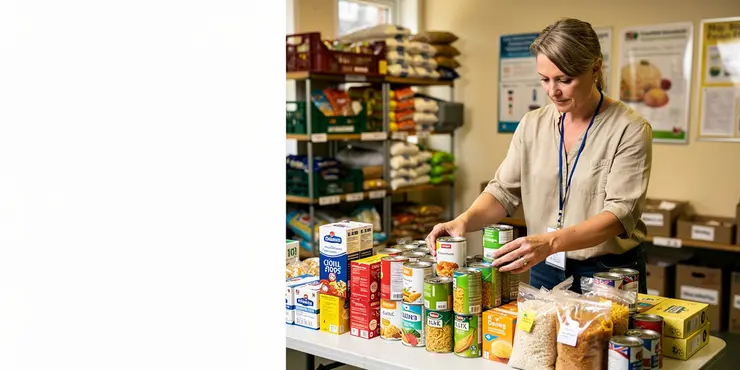
How can I support my local food bank?
Relevance: 28%
-

Citizens Advice Bureau Sees Spike in Queries Related to Council Tax Benefits
Relevance: 28%
-

Are refunds for overpaid Council Tax taxable?
Relevance: 27%
-

Impact of Housing Shortage on Local Communities
Relevance: 27%
-

Debate Intensifies Over Welfare Reforms Impacting Disabled Citizens
Relevance: 26%
-

Understanding the Impact of Rising Living Costs on Family Welfare
Relevance: 26%
-

How can carers access local resources and support services?
Relevance: 26%
-
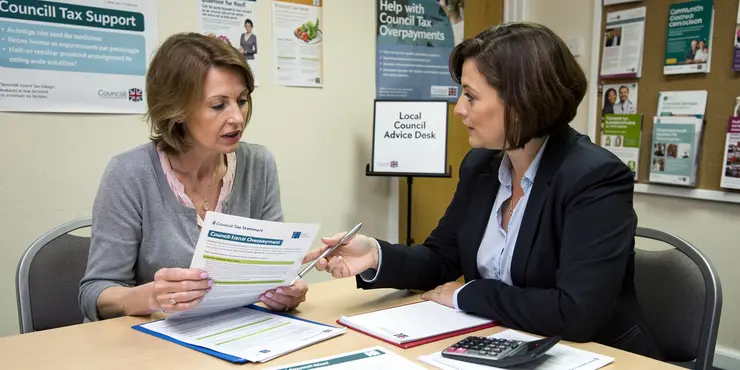
Will my council send a refund check if I overpay?
Relevance: 26%
-

Is there a plan to offer additional support to offset housing benefit cuts?
Relevance: 25%
-

New Report Highlights Gaps in Mental Health Services for Welfare Recipients
Relevance: 25%
-

Mental Health Services Struggle to Cope Amid Record Demand
Relevance: 25%
-

How does council tax relate to wealth in the UK?
Relevance: 25%
-

Does overpayment affect my Council Tax band?
Relevance: 25%
-

Is there a time limit for claiming a refund on overpaid Council Tax?
Relevance: 25%
-
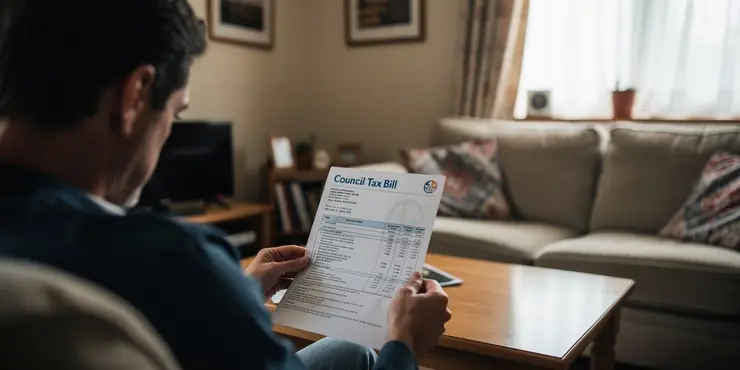
What should I do if I suspect an error in my Council Tax billing?
Relevance: 25%
-

Where can I get a copy of my Council Tax bill?
Relevance: 24%
-
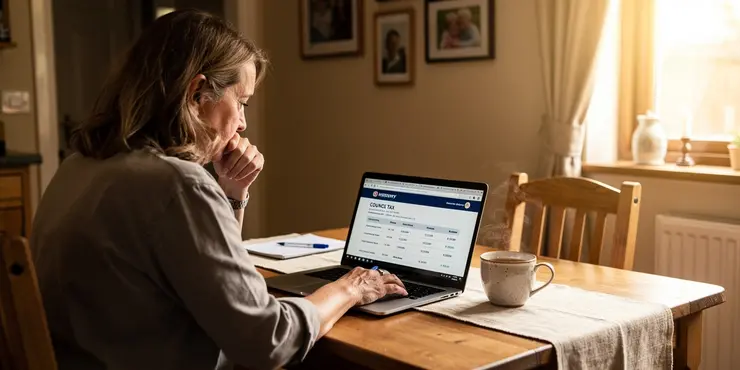
Can I access my Council Tax payment history online?
Relevance: 24%
-
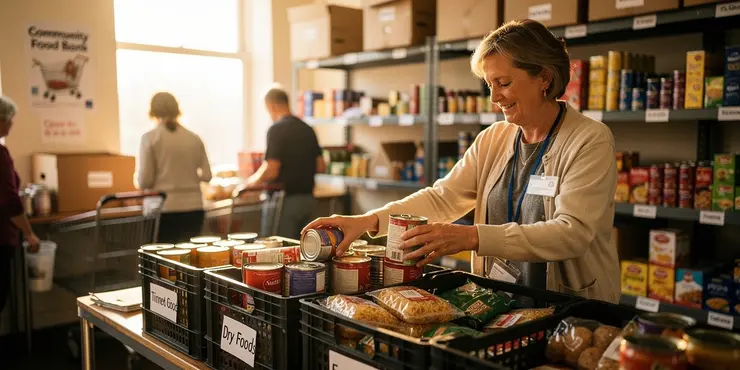
The Rise of Community Food Banks: Combating Hunger Locally
Relevance: 23%
-

How do can I find out if I have overpaid my UK Council Tax?
Relevance: 23%
-
Impact of UK Housing Crisis on Local Communities
Relevance: 23%
-

How does global energy demand affect UK energy prices?
Relevance: 22%
-

What details are needed to check for overpayments through my council?
Relevance: 22%
-
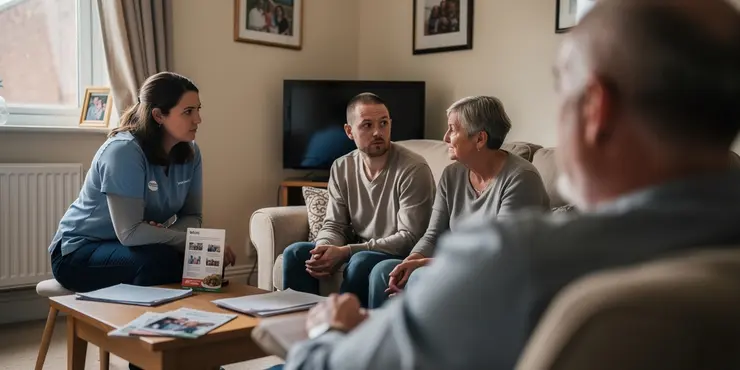
Addressing the Cost of Living Crisis: Community Support and Resources
Relevance: 21%
-

What Household & Cost‑of‑Living Support grants may be available to me?
Relevance: 21%
-
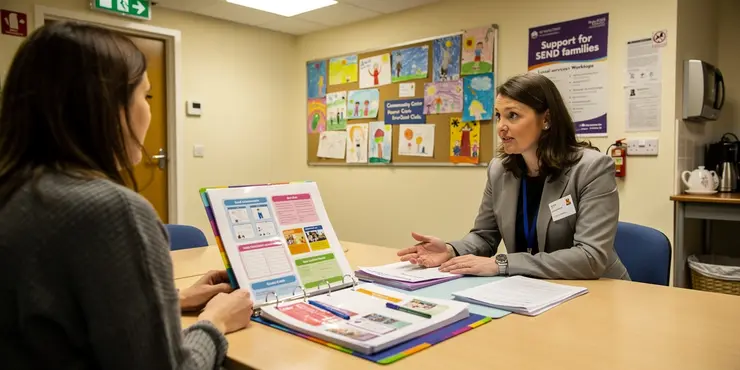
What support is available outside of school for SEND children?
Relevance: 20%
-

What British Council Scholarships/Bursaries may be available to help me with the education costs of my child?
Relevance: 20%
-
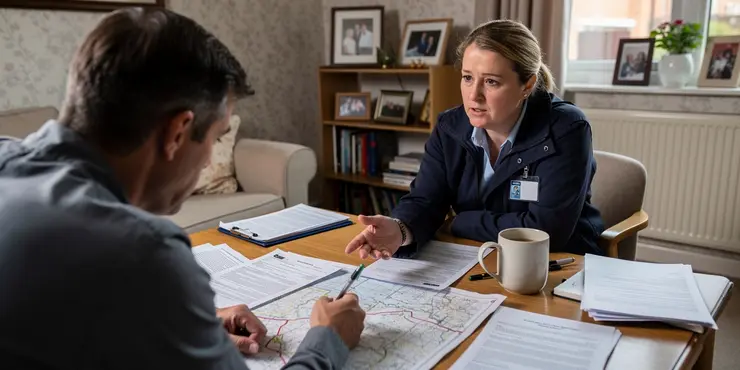
What is the role of local government in boundary disputes?
Relevance: 20%
-

Government Announces Increase in Universal Credit Payments Ahead of Winter
Relevance: 20%
-
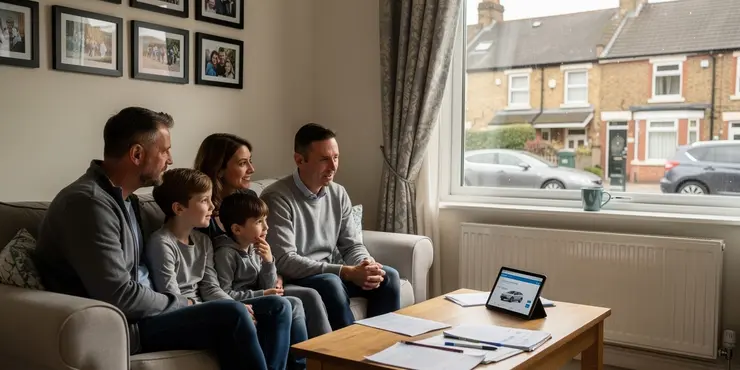
Are there local grants for electric vehicles?
Relevance: 20%
-

What support is available for families of individuals with PIMD?
Relevance: 19%
-
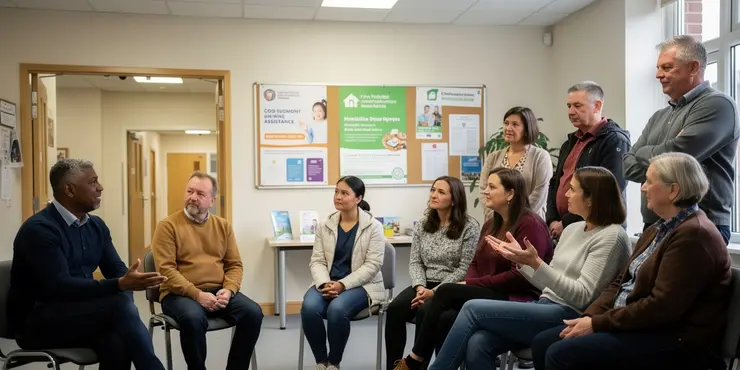
Addressing the Rising Cost of Living: Community Support and Resources
Relevance: 19%
-

What support is available for carers of Alzheimer's patients?
Relevance: 19%
-

Will the increase in the National Living Wage affect inflation?
Relevance: 19%
Introduction
In recent years, local councils across the United Kingdom have been facing unprecedented challenges in meeting the growing demand for welfare support. This surge in need is driven by various socio-economic factors, placing additional strains on already limited resources. As councils endeavor to address these challenges, they are finding that traditional mechanisms may no longer suffice in effectively supporting their communities.
Factors Contributing to Increased Demand
Several key factors have contributed to the rising demand for welfare support. Economic downturns, exacerbated by global events such as the COVID-19 pandemic, have led to job losses and reduced income for many households. Additionally, changes in the benefits system, such as the transition to Universal Credit, have left some recipients struggling to adjust. The cost of living crisis, particularly concerning housing and energy costs, has further heightened the demand for council support.
Impact on Local Councils
The increasing demand for welfare support has placed significant pressure on local councils. Budget constraints, a longstanding issue for councils, have been amplified as they try to stretch their resources to accommodate the rise in need. Many councils report that they are unable to meet the demand adequately, resulting in longer wait times for support and reduced service levels. The financial strain is compounded by reduced central government funding, necessitating difficult decisions about where to allocate limited funds.
Adapting to the Challenge
To cope with the surge in demand, local councils are exploring new strategies and partnerships. Many are collaborating with local charities and community groups to enhance their capacity to support vulnerable residents. Digital solutions are also being utilized more widely, allowing for streamlined application processes and improved communication with residents. Moreover, councils are advocating for additional funding and policy changes from the central government to better align resources with community needs.
The Role of Community
The role of the community has become increasingly vital in supporting local councils during this challenging period. Volunteer efforts have become an integral part of welfare support, helping to bridge gaps in service provision. Community initiatives such as food banks, clothing donations, and mental health support groups have alleviated some of the burdens on formal council services. This community-driven approach highlights the importance of collective action in addressing complex socio-economic challenges.
Conclusion
Local councils in the UK are navigating a difficult landscape as they strive to meet the growing demand for welfare support. Despite resource limitations, they remain committed to supporting their communities. However, sustainable solutions will require coordinated efforts between councils, community organizations, and the central government. As the situation evolves, flexibility and innovation will be key to ensuring that councils can continue to provide essential support to those in need.
Introduction
In the UK, local councils are finding it hard to help everyone who needs support. More people are asking for help because of problems like job losses and money troubles. Councils are trying their best, but their usual ways of helping might not be enough now.
Why More People Need Help
Many things have made more people need help. The COVID-19 pandemic made it hard for people to keep their jobs and earn money. New rules for benefits, like Universal Credit, are also confusing for some people. Making things worse, it is costing more to live, especially with rent and energy bills going up.
Challenges for Local Councils
With more people needing help, local councils are finding it tough to keep up. They don't have enough money, which means people wait longer for support. They also get less money from the government, so they have to choose carefully how to spend it.
How Councils are Trying to Help
To help more people, councils are trying new ideas. They are working with local charities and groups to support people better. They are also using digital tools to make it easier for people to ask for help. Councils are asking the government for more money and changes to help people more effectively.
The Importance of Community
The community plays a big role in helping out. Volunteers are helping councils by doing things like running food banks and clothing drives. They also help with mental health support. This teamwork is very important in helping people who are struggling.
Conclusion
Local councils in the UK are working hard to help more people. Even with limited money, they want to do their best for their communities. For long-term success, councils need to work together with charities, community groups, and the government. Being flexible and trying new ideas will be important to help everyone who needs it.
Frequently Asked Questions
What are local councils?
Local councils are local government bodies responsible for providing a range of public services and facilities in specific geographical areas.
Why are local councils struggling with increasing demand for welfare support?
Local councils are struggling due to a combination of factors including budget cuts, a growing population in need, and economic challenges that increase demand for welfare services.
What types of welfare support do local councils provide?
Local councils provide various welfare support services including housing assistance, food vouchers, financial aid, healthcare access, and social support programs.
How has the demand for welfare support increased recently?
The demand has increased due to economic downturns, rising unemployment rates, and the impact of global events leading to more individuals and families seeking support.
What challenges do local councils face in providing welfare support?
Challenges include limited funding, insufficient resources, managing growing caseloads, and the complexity of individual needs.
How do local councils fund welfare support services?
Funding comes from government grants, local taxes, and other community funding sources. However, funding levels may not always meet growing demands.
What are some potential solutions to help local councils manage increasing demand?
Solutions include increasing government funding, streamlining welfare services, improving cooperation with charities, and leveraging technology for efficiency.
How can technology help local councils in providing welfare support?
Technology can streamline administrative processes, enhance data management, improve service delivery efficiency, and provide better communication channels with beneficiaries.
What role do charities play in supporting local councils' welfare efforts?
Charities often collaborate with local councils to provide additional support and resources, extend services, and fill gaps in welfare provision.
How does increasing demand affect the quality of welfare support?
Increasing demand can strain resources, leading to longer wait times, reduced service quality, and the potential for unmet needs among those seeking support.
Are there any specific regions more affected by the demand for welfare support?
Regions with higher population densities, economic hardships, or cuts in service funding may experience greater demand and challenges.
How do local councils prioritize who receives welfare support?
Councils prioritize based on criteria such as urgency of need, income level, family status, and other vulnerability factors to ensure those most in need receive support.
What impact does economic downturn have on welfare support demand?
Economic downturn increases unemployment and financial instability, leading more people to seek welfare support for necessities like food, housing, and healthcare.
Can individuals influence how local councils manage welfare support?
Yes, individuals can participate in local council meetings, engage in public consultations, and vote in local elections to influence council policies and priorities.
What is the impact of government policies on local council welfare services?
Government policies can dictate funding levels, regulatory requirements, and strategic priorities, significantly impacting how local councils operate and allocate resources.
How can the community support local councils in providing welfare support?
Community members can volunteer, donate to local initiatives, advocate for increased funding, and support partnerships between councils and local organizations.
What are the consequences if local councils cannot meet welfare support demands?
Consequences include increased homelessness, poverty, social unrest, and greater reliance on emergency services, leading to broader community and economic issues.
How does social media impact the demand for welfare support?
Social media raises awareness of welfare issues, potentially increasing demand as more individuals become aware of and seek out available services.
How do local councils assess the effectiveness of their welfare support services?
Councils use metrics such as service uptake rates, client feedback, and outcome evaluations to gauge effectiveness and identify areas for improvement.
What are innovative approaches to address welfare support challenges?
Innovative approaches include integrating services, employing data analytics to target needs, adopting a preventative approach, and fostering multi-agency collaboration.
What are local councils?
Local councils are groups of people who make decisions for your area. They help keep things like parks, roads, and schools running well. Think of them like a team that works to make your town a better place.
If you want to know more, you can ask someone to explain. You can also look at pictures or videos online to help you understand better.
Local councils are groups that help run the area where you live. They do many jobs for the community, like looking after parks and collecting rubbish.
Why are local councils having a hard time giving more help to people?
Local councils are having trouble because more people need help. It is hard for councils because:
- They have less money to spend.
- More people are asking for help.
- Things cost more than before.
Here are some tools and tips that can help understand better:
- Use pictures to show ideas.
- Use simple words and short sentences.
- Ask someone to read it with you.
Local councils are having a hard time. This is because they have less money, more people need help, and there are money problems that make more people need support.
What help can you get from your local council?
Your local council can give you different types of help. Here are some examples:
- Money Help: If you don't have enough money, the council might give you benefits.
- Housing Help: If you need a place to stay, they can help find you a home.
- Food Help: If you need food, they may offer free food or vouchers.
- Support for Older People: They can offer help at home for older people.
- Help for Disabled People: Special support if you have a disability.
If you aren’t sure what help you can get, you can:
- Call the Council: Talk to them to learn more.
- Visit Help Centers: Go to places where people can help you.
- Ask Family or Friends: They might know what the council offers.
Local councils help people in different ways. They can help with finding a home, give out food vouchers, help with money, make sure people can see a doctor, and offer social support programs.
Why do more people need help with money now?
The need for help has grown. This is because the economy is not doing well, more people do not have jobs, and world events are causing problems. So, more people and families are asking for support.
What problems do local councils have when they try to help people with welfare support?
Local councils have a few problems when they try to help people with things like money, food, and houses.
- Sometimes they do not have enough money to help everyone.
- They may have lots of people needing help at the same time.
- It can be hard to know what each person really needs.
- Rules about giving help can be very complicated.
If you have trouble reading, ask someone you trust to read with you. You can also read a little bit at a time, and take breaks to understand better.
There are some problems:
- Not enough money
- Not enough things we need
- Many people to help
- Everyone needs different help
Here are some tips that might help:
- Set small goals.
- Ask for help if you need it.
- Use pictures or drawings to explain things.
How do local councils pay for help services?
Local councils are in charge of giving help to people who need it. This help is called "welfare support services." But how do local councils get the money to pay for this help?
Local councils get money from different places:
- Government Money: The main government gives money to local councils to help people.
- Local Taxes: People and businesses pay taxes, and this money helps pay for welfare support.
- Grants: Local councils can get special money called grants for certain projects.
Local councils use this money to provide services to help people with things like housing, health care, and education support.
If you have trouble reading or understanding, you can use tools to help you. These could be:
- Reading Apps: Use apps that read the text out loud for you.
- Simple Text: Look for websites or books with easy words.
- Ask for Help: You can ask someone to explain things to you.
Money comes from the government, local taxes, and other community money sources. But sometimes, there is not enough money for everything we need.
How can local councils get better at handling more work?
Managing more work is hard. Here are some ways councils can handle it: - **Make a Plan:** Councils can write a simple plan. It helps them know what to do first. - **Use Technology:** Computers and machines can help do work faster. - **Ask for Help:** Councils can work with other groups to get help. - **Listen to People:** It’s good to ask people what they need. - **Try New Ideas:** Councils can try new ways to do things. Tools that can help: - **Apps:** Use apps to keep track of to-do lists. - **Meetings:** Have meetings to talk and share ideas. - **Training:** Learn new things to work better. These steps can help councils do their jobs better.We can solve this by: giving more money from the government, making help easier to get, working better with charities, and using computers and the internet to do things faster.
How can computers help local councils give support to people?
Computers and the internet can help councils give support in better ways. Here are some ways they can help:
- Councils can use websites to share information with everyone. This makes it easy to find what people need.
- People can fill out forms online. It is quick and saves time.
- Councils can use emails and messages to talk to people. It is fast and easy.
- Computer programs can help councils keep track of who needs help.
These tools make it easier for councils to help more people in the best way possible.
Technology can help make admin work easier, keep track of information better, make services faster, and allow for better talking with people who use the services.
How do charities help local councils with welfare?
Charities often work together with local councils. They do this to give extra help and resources. They also extend services and fill in the gaps where help is needed.
Tools like simple language dictionaries or text-to-speech software can be really helpful for understanding. Taking breaks and asking someone to explain can also help.
What happens to welfare support when more people need it?
When more people need welfare support, it can change how good the help is. Here are some things that might happen:
- If lots of people ask for help, there might not be enough for everyone. This can make the support less good.
- Some services might not be as quick or as good because they are too busy helping too many people.
Here are some things that can help:
- Using tools like pictures or symbols to show information. This can make it easier to understand.
- Asking a friend or a support worker to help read or explain things.
- Writing down questions you have before talking to someone about welfare support. This can help you remember what to ask.
More people asking for help can stretch thin the things we need. This can mean:
- We have to wait longer for what we need.
- The help we get might not be as good.
- Some people might not get any help at all.
Using tools like simple planners or asking a friend to explain things can help us understand and manage this better.
Do some places need more help from welfare support?
Places with more people living close together, money problems, or less money for services might have more needs and difficulties.
How do local councils decide who gets help from welfare?
Local councils give out help to people. But they need to decide who gets help first.
This is how they decide:
- They look at who needs a lot of help quickly.
- They check who has the least money or support.
- They see how they can help the most people.
If you need help, you can:
- Ask someone from your family or a friend to help you talk to the local council.
- Use pictures or videos to understand better.
- Write down what help you need.
It is okay to ask for help!
Councils decide who needs help first. They look at things like how urgent the need is, how much money a person has, their family situation, and other things that might make someone need more help. This way, people who need help the most get it first.
Here are some tips to help understand this better:
- Read slowly and take your time.
- If you don’t understand a word, ask someone or use a dictionary.
- Use colors or drawings to help remember important points.
How does a weak economy affect the need for help from the government?
When the economy is not doing well, more people lose their jobs. This can make money problems worse for families. Because of this, more people need help to get food, a place to live, and to see a doctor.
Can people help local councils make decisions about welfare support?
Yes, people can take part in local council meetings. They can share their ideas in public meetings and vote in local elections. This helps them have a say in what the council does and what is important to them.
How do government rules change local council help services?
Government rules are like instructions. They tell local councils what to do and how to run. This can change how councils help people in their area.
Here are some ways government rules may change local help services:
- Changing the money local councils get for help services.
- Deciding what services local councils must have.
- Changing the rules for who can use the services.
Some tools that might help:
- Ask a friend or carer to explain.
- Use a search engine to find simple videos.
- Look for events where you can ask questions about local council services.
The government makes rules about how money is spent and what is important. These rules can change how local councils do their work and use their money.
How can people help local councils give support to those in need?
Ways to help:
- Donate items like food and clothes.
- Volunteer your time to help others.
- Share information on social media.
- Join local groups to offer support.
Tools that can help:
- Use simple maps to find local charities.
- Follow easy guides on how to volunteer.
- Download apps to join community events.
- Use websites that show ways to help.
People in the community can help in these ways:
- They can give their time to help.
- They can give money or things to local projects.
- They can speak up for more money to support community work.
- They can help the council work with local groups.
To understand better or get support, you can use pictures, ask questions, or talk about it with someone you trust.
What happens if local councils can't help everyone who needs it?
This can lead to more people not having a home, more poverty, and more people being upset. It also means more people need help from emergency services. All of this can cause problems for the community and the economy.
How does social media affect the need for help from welfare services?
Social media is websites like Facebook and Twitter where people talk to each other. Sometimes, people see things on social media that make them feel unhappy or worried. When people feel like this, they might need more help from welfare services. Welfare services are places that help people who are having a hard time. If you are finding it difficult to understand, ask someone to explain it to you. You can also use light pens or sticky notes to highlight important parts. Talk to a friend or a helper if you need more help.Social media helps people learn about important issues. This means more people might ask for help when they know where to find it.
How do local councils check if their help services are good?
Local councils want to make sure their help services are useful. They check to see if people are getting the support they need.
Here are some ways they check:
- Ask people what they think about the help they get.
- Look at how many people use the services.
- See if people's lives are getting better with the help.
- Talk to the workers to see what's working well.
Tools like pictures, videos, and easy-to-read charts can help understand better.
Councils use different ways to see how well they are doing. They look at:
- How many people use their services.
- What people say about their services.
- How well things are working.
These help find what can be better.
It can be helpful to use pictures, charts, or simple words to understand this information.
Another good idea is to ask someone to explain it to you or work with a friend.
How can we find new ways to help people who need support?
Here are some ideas to make it easier:
- Use pictures and videos to explain things.
- Ask people what help they need.
- Work with others to share good ideas.
- Use apps or tools that help with learning and understanding.
- Give clear and simple instructions.
New ways to help include bringing services together, using computers to understand what people need, stopping problems before they start, and getting different groups to work together.
Useful Links
This website offers general information and is not a substitute for professional advice.
Always seek guidance from qualified professionals.
If you have any medical concerns or need urgent help, contact a healthcare professional or emergency services immediately.
Some of this content was generated with AI assistance. We’ve done our best to keep it accurate, helpful, and human-friendly.
- Ergsy carfully checks the information in the videos we provide here.
- Videos shown by Youtube after a video has completed, have NOT been reviewed by ERGSY.
- To view, click the arrow in centre of video.
- Most of the videos you find here will have subtitles and/or closed captions available.
- You may need to turn these on, and choose your preferred language.
- Go to the video you'd like to watch.
- If closed captions (CC) are available, settings will be visible on the bottom right of the video player.
- To turn on Captions, click settings .
- To turn off Captions, click settings again.
More Items From Ergsy search
-

Local Councils Struggle with Increasing Demand for Welfare Support
Relevance: 100%
-

Local Councils Call for More Funding to Support Rising Homelessness
Relevance: 38%
-

Proposed Welfare Cuts and Their Impact on Vulnerable Populations
Relevance: 35%
-

Study Reveals Disparities in Welfare Support Between Urban and Rural Areas
Relevance: 34%
-

Why are council burial fees going up nearly 50% in the UK?
Relevance: 29%
-

Government Faces Backlash Over Welfare System Access Delays
Relevance: 29%
-

What role do local councils play under the new law?
Relevance: 29%
-

How can I support my local food bank?
Relevance: 28%
-

Citizens Advice Bureau Sees Spike in Queries Related to Council Tax Benefits
Relevance: 28%
-

Are refunds for overpaid Council Tax taxable?
Relevance: 27%
-

Impact of Housing Shortage on Local Communities
Relevance: 27%
-

Debate Intensifies Over Welfare Reforms Impacting Disabled Citizens
Relevance: 26%
-

Understanding the Impact of Rising Living Costs on Family Welfare
Relevance: 26%
-

How can carers access local resources and support services?
Relevance: 26%
-

Will my council send a refund check if I overpay?
Relevance: 26%
-

Is there a plan to offer additional support to offset housing benefit cuts?
Relevance: 25%
-

New Report Highlights Gaps in Mental Health Services for Welfare Recipients
Relevance: 25%
-

Mental Health Services Struggle to Cope Amid Record Demand
Relevance: 25%
-

How does council tax relate to wealth in the UK?
Relevance: 25%
-

Does overpayment affect my Council Tax band?
Relevance: 25%
-

Is there a time limit for claiming a refund on overpaid Council Tax?
Relevance: 25%
-

What should I do if I suspect an error in my Council Tax billing?
Relevance: 25%
-

Where can I get a copy of my Council Tax bill?
Relevance: 24%
-

Can I access my Council Tax payment history online?
Relevance: 24%
-

The Rise of Community Food Banks: Combating Hunger Locally
Relevance: 23%
-

How do can I find out if I have overpaid my UK Council Tax?
Relevance: 23%
-
Impact of UK Housing Crisis on Local Communities
Relevance: 23%
-

How does global energy demand affect UK energy prices?
Relevance: 22%
-

What details are needed to check for overpayments through my council?
Relevance: 22%
-

Addressing the Cost of Living Crisis: Community Support and Resources
Relevance: 21%
-

What Household & Cost‑of‑Living Support grants may be available to me?
Relevance: 21%
-

What support is available outside of school for SEND children?
Relevance: 20%
-

What British Council Scholarships/Bursaries may be available to help me with the education costs of my child?
Relevance: 20%
-

What is the role of local government in boundary disputes?
Relevance: 20%
-

Government Announces Increase in Universal Credit Payments Ahead of Winter
Relevance: 20%
-

Are there local grants for electric vehicles?
Relevance: 20%
-

What support is available for families of individuals with PIMD?
Relevance: 19%
-

Addressing the Rising Cost of Living: Community Support and Resources
Relevance: 19%
-

What support is available for carers of Alzheimer's patients?
Relevance: 19%
-

Will the increase in the National Living Wage affect inflation?
Relevance: 19%


